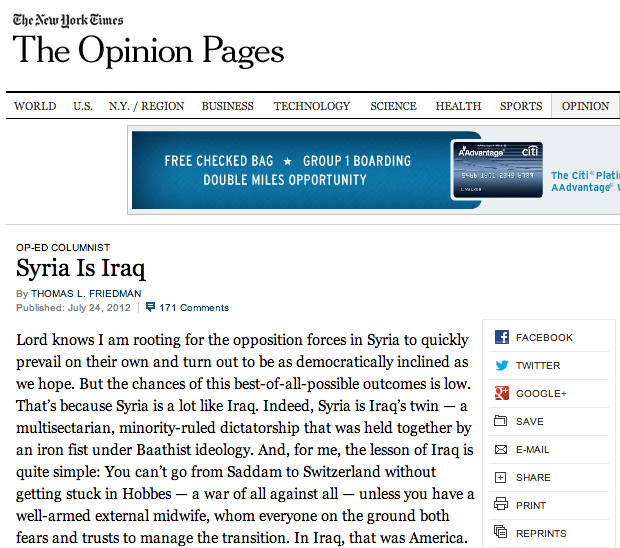Last night, New York Times columnist (and former executive editor) Bill Keller’s column, “Syria Is Not Iraq,” appeared online. (It’s seen in the above screenshot at right, juxtaposed against equally intellectually-challenged fellow columnist Thomas Friedman’s piece from last year.) As usual, it was a doozy:
As a rule, I admire President Obama’s cool calculation in foreign policy; it is certainly an improvement over the activist hubris of his predecessor. And frankly I’ve shared his hesitation about Syria, in part because, during an earlier column-writing interlude at the outset of the Iraq invasion, I found myself a reluctant hawk. That turned out to be a humbling error of judgment, and it left me gun-shy.
Of course, there are important lessons to be drawn from our sad experience in Iraq: Be clear about America’s national interest. Be skeptical of the intelligence. Be careful whom you trust. Consider the limits of military power. Never go into a crisis, especially one in the Middle East, expecting a cakewalk.
But in Syria, I fear prudence has become fatalism, and our caution has been the father of missed opportunities, diminished credibility and enlarged tragedy.
Keller concludes:
Whatever we decide, getting Syria right starts with getting over Iraq.
No, Keller, it doesn’t. Getting Syria right starts with acknowledging how Iraq happened. But doing that would require directly confronting the central role of Keller’s paper in propagating a flimsy and ultimately disastrous case for war in Iraq. Getting over Iraq, to use Keller’s convenient word choice, is a euphemism for allowing the same source that got everything so wrong in Iraq to make the same case for war in another country — again, with no exit strategy or, even, any strategy at all.
Keller argues that our failure to arm the rebels for fear of assisting al-Qaeda is in fact resulting in the same outcome, by ceding ground to the Saudis and Qataris, who are all too willing to assist radicals on the ground in Syria. But what Keller fails to mention is the fact that, after two years of civil war, an American decision to intervene now would raise more questions than it answers and may very well cause a public opinion backlash in the Arab world. Instead of being lauded as saviors, there is at least an equivalent likelihood of rebels asking, “How many lives could you have saved if you’d been here earlier?”
That alone is not a reason to stay away. But the audacity of the clamor for intervention — led by people like John McCain and, yes, now Bill Keller, the same people who so badly misjudged the prospects for success in Iraq — is that it makes the same characterizations about Syria that it did about Iraq. You’d think once would be enough.
Keller writes:
What you hear from the Obama team is that we know way too little about the internal dynamics of Syria, so we can’t predict how an intervention will play out, except that there is no happy ending; that while the deaths of 70,000 Syrians are tragic, that’s what happens in a civil war; that no one in the opposition can be trusted; and, most important, that we have no vital national interest there. Obama conceded that the use of poison gas would raise the stakes, because we cannot let the world think we tolerate spraying civilians with nerve gas. But even there, the president says he would feel obliged to respond to “systematic” use of chemical weapons, as if something less — incremental use? sporadic use? — would be O.K. This sounds like a president looking for excuses to stand pat.
This is a sickening, absurdist paragraph. “Looking for excuses to stand pat?” In Keller’s conceptualization, then, war is the default option, and Obama is doing somersaults in an attempt to evade his natural obligations. But this is simply not the case. Obama is perfectly right to observe that no vital national interest necessitates an American intervention in Syria (although he is seemingly less confident on this score than previously thought).
Keller’s not done:
In contemplating Syria, it is useful to consider the ways it is not Iraq.
First, we have a genuine, imperiled national interest, not just a fabricated one. A failed Syria creates another haven for terrorists, a danger to neighbors who are all American allies, and the threat of metastasizing Sunni-Shiite sectarian war across a volatile and vital region. “We cannot tolerate a Somalia next door to Israel, Lebanon, Jordan, Iraq and Turkey,” said Vali Nasr, who since leaving the Obama foreign-policy team in 2011 has become one of its most incisive critics. Nor, he adds, can we afford to let the Iranians, the North Koreans and the Chinese conclude from our attitude that we are turning inward, becoming, as the title of Nasr’s new book puts it, “The Dispensable Nation.”
Again, Keller’s historical — and personal — amnesia, combined with his implicit but entirely unsubtle smearing of prudent foreign policy analysts as appeasers, is appalling. There is no “genuine, imperiled national interest.” The primary reason everyone’s suddenly started talking about Syria is that Israel started bombing it. As always, Israel’s security interests take precedence over our own: where two years of civilian death and suffering elicited little more than yawns and sighs of boredom in living rooms throughout America, a few targeted airstrikes by Israel are amazingly effective at focusing the hive mind.
Keller writes:
But, as Joseph Holliday, a Syria analyst at the Institute for the Study of War, points out, what gets lost in these calculations is the potentially dire cost of doing nothing. That includes the danger that if we stay away now, we will get drawn in later (and bigger), when, for example, a desperate Assad drops Sarin on a Damascus suburb, or when Jordan collapses under the weight of Syrian refugees.
Yes, let’s go to war now, risking very real American lives, to prevent a hypothetical outcome that may or may not cause mass fatalities in another country’s civil war.
Here is perhaps my favorite line:
Fourth, in Iraq we had to cajole and bamboozle the world into joining our cause. This time we have allies waiting for us to step up and lead. Israel, out of its own interest, seems to have given up waiting.
Israel?! That’s his example? Israel, he may recall, was perfectly onboard with the American invasion of Iraq as well. And why shouldn’t it be? Any half-conscious human being can see the natural advantage of allowing a foreign country to wage war on another’s behalf — including paying the costs in lives and massive budget deficits. Israel can stand pat and let Americans take the heat again, as we’ve been doing for years.
“Why wait for the next atrocity?” Keller asks. Indeed, why? For neoconservative warmongers like Bill Keller, waiting is for appeasers. The case for intervention in Syria, like that in Iraq, recalls the title of the famous post-financial crisis book, This Time Is Different. Each time, excuses and half-justifications are lazily proffered so as to distinguish one hawkish prophecy from its disastrous predecessors. This time, let’s approach the problem differently, instead of feebly attempting to differentiate this potential foreign policy quagmire from another, very real one from the past.


















